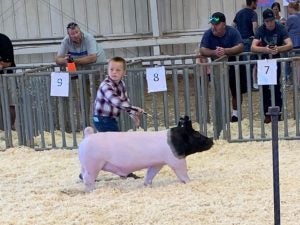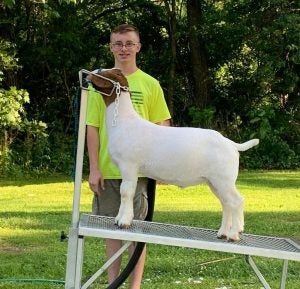From donations to extra meat for your family, here are some options for livestock-showing families to consider
There aren’t many aspects of life that haven’t been impacted by COVID-19, and showing livestock is no exception. Fairs and jackpot shows have been canceled due to the pandemic, like many other agricultural events and activities.
However, that can leave livestock-showing families stuck between a rock and a hard place. What can be done to find a home for livestock after the stunted show season, if county fair auctions or terminal shows at state or regional fairs aren’t available options?
We’ve put together a list of ideas to consider.
Work your network
Talk to your coworkers, church friends, neighbors, or relatives. Would any of them be interested in a half or quarter to put in their freezer? Many folks are willing to pay for home-raised meat, and they can help pay for processing as well. You can also utilize your network on social media to find acquaintances farther afield who might be interested in purchasing your project animal.
Chrissy Pribisco of Stahlstown, Pennsylvania, was able to find a buyer for one of her kids’ swine projects. Her kids, Jase, age 6, and Josie, age 4, show sheep and hogs and sell them at the Derry Ag Fair Junior Market Sale.
“Normally, we sell the animals at the end of fair week at the junior market livestock sale,” Pribisco says. “I work as a vet tech, and my boss purchased one of Jase’s pigs. They’re going to use it for their own family freezer.”

Donate the meat
Some local events might still be scheduled. Work with an organization in your hometown to raffle off a pig or steer as a fundraiser. Animals can even be split in halves or quarters to sell more chances. With so many families facing lost income due to the virus, food pantries are also in desperate need of additional donations. An entire lamb or steer donated to a food pantry can feed a lot of needy families in your area, and it makes a great story for your record book as a community service activity.
Fill your freezer
Many livestock showing families typically keep one animal back for their own freezer. With the meat supply chain being affected by COVID-19, it’s a good idea to stock up your freezer — and what better source than a home-raised animal?
Adam Starr of Niles, Michigan, has been a 4-H member for seven years and raises pigs and goats. Adam’s mother, Barbie, says that usually the family keeps one animal of each species in their freezer, but not this year.
“Our county fair and the Michigan Livestock Expo have been converted into day-long jackpot type events,” she says. “Our county didn’t offer a virtual livestock auction, so we’re going to put them all in our freezer. We like to give out the meat as gifts to neighbors, or janitors at the school where I teach, people like that.”

Sell the animal to another showing family
Do you know of other livestock families that are showing in other states? They might be willing to buy your animal to add to their show string.
Through a family friend, Pribisco was able to connect with a Virginia family who purchased one of her kids’ wether lambs.
“They’re going to show it at the Virginia State Fair, if it happens,” she says. “Our show season is over now, and we hated to see that lamb go to the butcher.”
Unfortunately, Virginia announced that it has canceled its state fair for 2020.
Start planning for next year
Hopefully, the pandemic will have ebbed enough by next summer to allow for livestock shows to resume. If this year’s show season just didn’t pan out, hope is not lost. If you raise breeding animals, this is the year to focus on making the best breedings possible to get stellar offspring for next year’s show season.
“The Michigan State Fair is mostly for breeding animals,” Adam says. “Last year, I decided to focus more on goats, both for breeding and market. The Michigan Livestock Expo even has a Michigan born and bred class. I bought my first two does last year, and I added two more this year — a full blood and a crossbred. I really like goats and want to expand my herd because I really like them. I’ve invested a lot in them this year.”
Sarah Hill is an agricultural writer and communications professional from Hetland, South Dakota. She grew up on a dairy in Missouri and is a 2008 graduate of the University of Missouri with a degree in Agricultural Journalism



